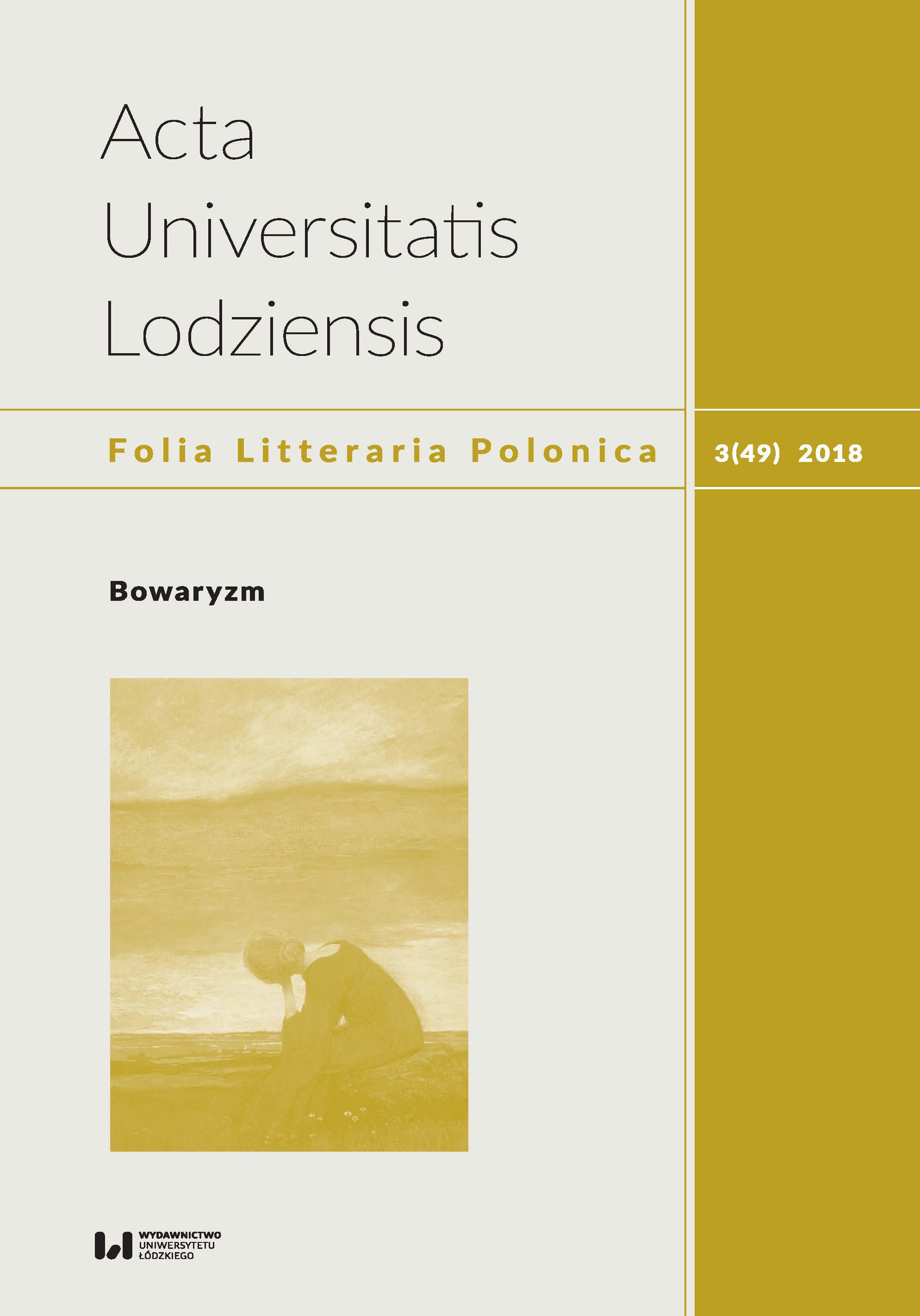Emma, Luiza i inne, czyli bovaryzm w Portugalii i Brazylii
DOI:
https://doi.org/10.18778/1505-9057.49.04Słowa kluczowe:
the History of Ideas, poetics of la revêrie, French literature, le bovarysme, Lusophone literatureAbstrakt
The author uses the traditional methodology of literary history, making references to the critics of the myth and phantoms and the history of ideas. Based on the ideas of the theorists and writers of the West (George Sand, Charles Baudelaire, Vladimir Nabokov, Frederic Brown) and prominent Polish scholars (Maria Janion, among others), the author analyses the notion of le bovarysme within the realm of tragic „romantic dream taken out from romantic oeuvres” (MJ). The moral collapse of Emma Bovary and Luiza Mendonca as the heroines of Gustave Flaubert and Eca de Queiroz (in the novel Cousin Bazilio, 1878) would have a relation with the exhaustion of the pattern of the romantic poetics of dreaming (la reverie) and with undertaking by the Portuguese and Brazilian writers of the tasks outlined before the realistic literature „of a thesis” –what is summoned up is the thesis of the susceptibility of a woman to adultery. The Lusopohone metamorphoses and continuations of Emma Bovary are in a close relationship with the literary creation of Eca de Queiroz (in the novel in question and in the tale In the Windmill) as well as of Machado de Assis – the predecessor of the Brazilian realism and of numerous writers who use Portuguese and Spanish in Europe and Latin America.
Pobrania
Bibliografia
Baudelaire Charles, „Pani Bovary” Gustava Flauberta, wyd. 2 zm. i uzup., w: Sztuka romantyczna, przekład i wstęp A. Kijowski, komentarz i przypisy C. Pichois, słowo/obraz terytoria, Gdańsk 2003, s. 95–105.
Google Scholar
Brown Frederic, Pani Bovary, w: Gustaw Flaubert w niewoli słowa i kobiet, przeł. L. Niedzielski, Twój Styl, Warszawa 2008, s. 363–369.
Google Scholar
Ceia Carlos, E-Dicionário de Termos Literários, http://edtl.fcsh.unl.pt/author/cceia/ [dostęp 29.08.2017].
Google Scholar
Engelking Ryszard, Jak dziś czytać „Panią Bovary”, w: Gustaw Flaubert, Pani Bovary. Z obyczajów prowincji, przeł. i posł. R. Engelking, słowo/obraz terytoria, Gdańsk 2005, s. 341–360.
Google Scholar
Flaubert Gustave, Madame Bovary, extraits avec une notice sur la vie et l´art de Flaubert, une présentation et une analyse de lº oeuvre, une étude littéraire, des notes, des questions, des jugements et des thèmes de réflexion par Jacques Gautreau, Bordas, Paris 1987.
Google Scholar
Flaubert Gustave, Pani Bovary, przekł. Aniela Micińska, przedmową poprzedził J. Parandowski, Państwowy Instytut Wydawniczy, Warszawa 1957.
Google Scholar
Flaubert Gustave, Pani Bovary. Z obyczajów prowincji, przeł. i posłowiem opatrzył R. Engelking, słowo/obraz terytoria, Gdańsk 2005.
Google Scholar
Gonçalves, Henriqueta Maria Almeida; Monteiro, Maria da Assunção Morais, Introdução à leitura de contos de Eça de Queirós, Almedina, Coimbra 2001.
Google Scholar
Janion Maria, Kapelmistrz Kreisler i pani Bovary, w: Prace ofiarowane Henrykowi Markiewiczowi, red. T. Weiss, Wydawnictwo Literackie, Kraków–Wrocław 1984, s. 321–334.
Google Scholar
Kalewska Anna, A fortuna cultural do Prefácio a „O Mandarim” de Eça de Queirós: a correspondência de Ladislao Mickiewicz e Oliveria Martins como factor de internacionalizacão de Eça, w: Congresso de Estudos Queirosianos IV Encontro Internacional de Queirosianos Actas, org. C. Reis i inn., Instituto de Língua e Literatura Portuguesas, Faculdade de Letras da Universidade de Coimbra 6 a 8 de Setembro de 2000, Almedina, Coimbra 2002, vol. 1, s. 379–391.
Google Scholar
Kalewska Anna, Bettina von Arnim, Rilke i Mariana Alcoforado – o pozorności kobiecego dyskursu powieściowego, „Studia Niemcoznawcze” 2015, vol. 16, s. 295–309.
Google Scholar
Klave Janina Z., Historia literatury portugalskiej. Zarys, Ossolineum, Wrocław 1985.
Google Scholar
Klave Janina Z., Posłowie, w: Eça de Queirós, Kuzyn Bazyli, przeł. E. Reis, Wydawnictwo Literackie, Kraków 1978, s. 398–404.
Google Scholar
Lis Renata, Ręka Flauberta, wyd. 2, przejrzane i popr., Wydawnictwo Sic!, Warszawa 2012.
Google Scholar
Lourenço, António Apolinário, De “Madame Bovary” ao “Primo Basílio”: a singularidade bovarista de Luísa, “Letras de Hoje” 2012, Porto Alegre (Brasil), 47 (4), s. 413–419, http://revistaseletronicas.pucrs.br/ojs/index.php/fale/article/view/12776 [dostęp 24.08.2017].
Google Scholar
Łukaszyk Ewa, Imperium i nostalgia. „Styl późny” w kulturze portugalskiej, DiG, Warszawa 2015.
Google Scholar
Moisés Massaud. 2004 (ed. revista e ampliada, 1ª ed. 1975). Dicionário de Termos Literários, São Paulo: Cultrix.
Google Scholar
Moraes Rita Mara Netto de, A condição feminina no matrimônio, delineada pela ficção. Tese submetida ao Curso de Pós-Graduação em Literatura da Universidade Federal de Santa Catarina para a obtenção do grau de Doutora em Literatura. Orientadora: Profa. Dra. Odília Carreirão Ortiga, Universidade de Santa Catarina, Florianópolis 2009, ms, https://repositorio.ufsc.br/bitstream/handle/123456789/92469/281158.pdf?sequence=1 [dostęp: 23.08.2017].
Google Scholar
Nabokov Vladimir, Gustav Flaubert (1821–1880) Pani Bovary (1856), w: Wykłady o literaturze, przekł. Z. Batko, Muza S.A., Warszawa 2000, s. 185–244.
Google Scholar
Parandowski Jan, Przedmowa, w: Gustaw Flaubert, Pani Bovary, Państwowy Instytut Wydawniczy, Warszawa 1957, s. 5–25.
Google Scholar
Queirós, Eça de, Kuzyn Bazyli, przeł. E. Reis, Wydawnictwo Literackie, Kraków 1978.
Google Scholar
Queirós Eça de, No Moinho. W: H.M. Almeida Gonçalves, M. da Assunção Morais Monteiro, Introdução de Contos de Eça de Queirós, 2ª ed. revista, Almedina, Coimbra 2001, s. 142–153.
Google Scholar
Queiroz Eça de, O Primo Bazilio. Episódio Doméstico, 17ª ed., fixação de texto e notas de Helena Cidade Moura, de acordo com a segunda edição (1878) precedida de uma carta inédita do Dr. José Maria d´Almeida de Queiroz a seu filho, Livros do Brasil, Lisboa s.d. [1953?].
Google Scholar
Sand George, Listy do Flauberta, w: Eseje, przeł. S. Kożuchowska, M. Dramińska-Joczowa, Państwowy Instytut Wydawniczy, Warszawa 1958, s. 205–214.
Google Scholar
Żurowski Maciej, „Pani Bovary” i rozwój powieści nowoczesnej, „Przegląd Humanistyczny” 1958, nr 4 (7), s. 17–45.
Google Scholar
Pobrania
Opublikowane
Jak cytować
Numer
Dział
Licencja

Utwór dostępny jest na licencji Creative Commons Uznanie autorstwa – Użycie niekomercyjne – Bez utworów zależnych 4.0 Międzynarodowe.











